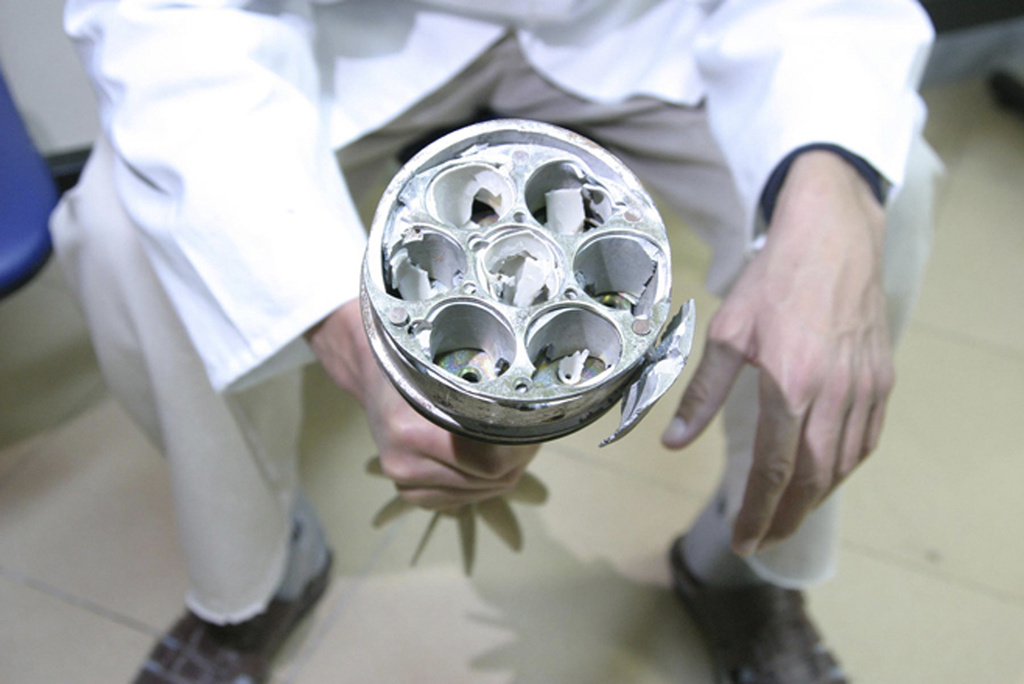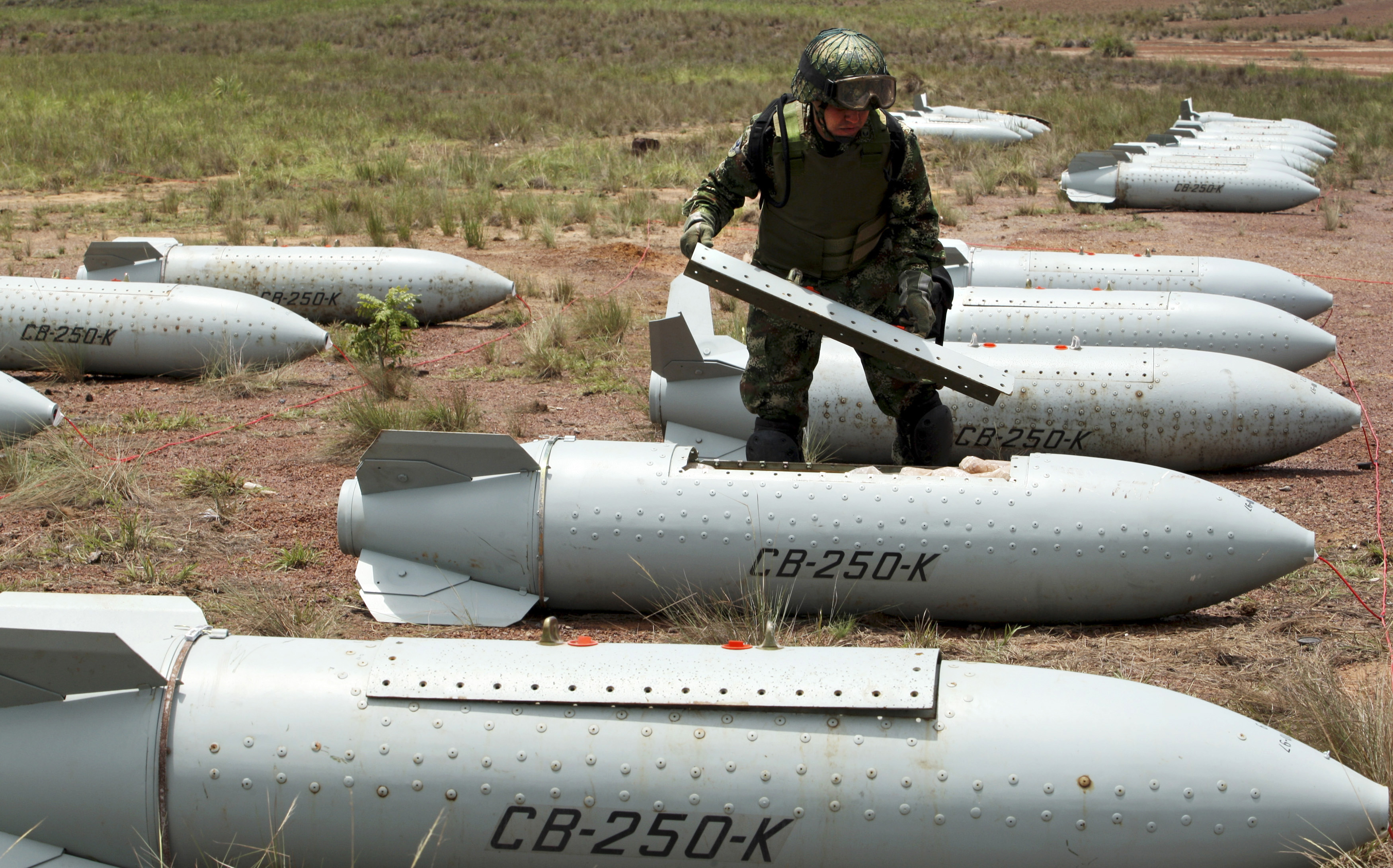Cluster bomb ban wins parliament’s approval

Parliament has paved the way for Switzerland to ratify an international agreement banning the worldwide use, production, transfer and financing of cluster bombs.
But non-governmental groups criticised its failure to include effective ways to combat opaque funding schemes, while conservatives argued that the impact on Switzerland’s defence capability is unclear.
Following a second round of debate, the House of Representatives voted overwhelmingly in favour of the convention on cluster munitions, despite opposition by some members of the right-wing Swiss People’s Party.
The other parliamentary chamber, the Senate, had approved the treaty last year. Agreed at an international conference in 2008, it has so far been ratified by 68 states.
During Monday’s debate, Foreign Minister Didier Burkhalter stressed the broad international acceptance of the accord and the importance of Switzerland’s stance.
“Nearly all European countries have ratified it. It is crucial that Switzerland follows suit, because refusal to do so would be difficult to explain at an international level,” he said.
Burkhalter said approval of the treaty had also a symbolic value and would help keep up pressure on non-signatory countries as it did in the case of a ban on anti-personnel mines.
Long time
Ursula Haller, member of the centre-right Conservative Democratic Party and speaker of the defence affairs committee, added that Switzerland – the depositary state of the Geneva Conventions on Human Rights – should have banned cluster bombs long ago as they cause the most victims among the civilian population.
Roland Borer of the People’s Party was one of those who opposed the ban.
“I voted against because we are still waiting for a report about the possible impact of the ban on Switzerland’s defence capability,” he explained.
The government has pledged to present a study of the issue by the end of next year. Between 1988 and 2004 the Swiss armed forces bought about 200,000 shells for its artillery. The stockpile will have to be destroyed within the next eight years at a cost of up to SFr35 million ($38.3 million).
Funding
The treaty also includes a ban on the direct and indirect financing of cluster munitions. But proposals submitted mainly by the centre-left to tighten the regulations still further failed to win a majority in the house on Monday.
Opponents described the additional proposals as unnecessary and impractical.
The Social Democrats and the Greens had wanted to outlaw investment schemes which cannot explicitly guarantee that they will never violate the terms of the international agreement.
Several non-governmental organisations (NGOs) warned that more efficient legislation was key to preventing banks financing cluster bomb production.
The Swiss section of the Handicap International group expressed its disappointment, saying parliament had failed to address the problem of how to fight the funding of cluster munitions production effectively.
There is a real risk that pension funds from Switzerland could invest in the manufacturing of banned weapons, according to a statement issued by Handicap International.
“It is now up to civil society to publish the names of those companies which produce outlawed weapons and to point the finger at those financial institutions in Switzerland which violate the law,” the group said.
U-turn
In its passage through parliament, the bill experienced a U-turn in the House of Representatives last December.
The House defence affairs committee had originally recommended rejection of the treaty, amid warnings by conservatives that it could undermine Switzerland’s defence capabilities.
But that move prompted concern about Switzerland’s humanitarian tradition.
After general elections in October, the new House ignored the recommendation and called for a review.
The subsequent policy change was seen as a slap in the face of conservative parliamentarians and representatives of the armament industry in particular.
The Senate for its part had approved the treaty unanimously last autumn slightly amending the cabinet’s draft bill.
A cluster munition is a weapon that disperses or releases explosive submunitions: small, unguided explosives or bomblets that are designed to explode prior to, on or after impact. The number of submunitions dispersed can vary from several dozens to over 600.
Around 35 countries are known to have produced over 210 different types of cluster munitions.
At least 87 countries currently stockpile cluster munitions or have done so in the past. Current stocks amount to millions of cluster munitions, containing billions of individual submunitions. Out of the 87 countries that have or have had stockpiles of cluster munitions, 16 have actually used them during armed conflict.
The Swiss state-owned arms manufacturer Ruag has assembled cluster bombs in the past using components built in the country or imported from Israel. It stopped production in 2003. Switzerland is thought to have around 200,000 such shells.
Source: ICRC, 2010
The Convention on Cluster Munitions was agreed at a conference in Dublin in 2008.
More than 110 countries have signed the treaty so far, but only about 70 of them – including Germany, France, Britain and Italy – have so far ratified it.
The US, Russia, China, India and Israel have not signed the treaty at all.

In compliance with the JTI standards
More: SWI swissinfo.ch certified by the Journalism Trust Initiative













You can find an overview of ongoing debates with our journalists here . Please join us!
If you want to start a conversation about a topic raised in this article or want to report factual errors, email us at english@swissinfo.ch.